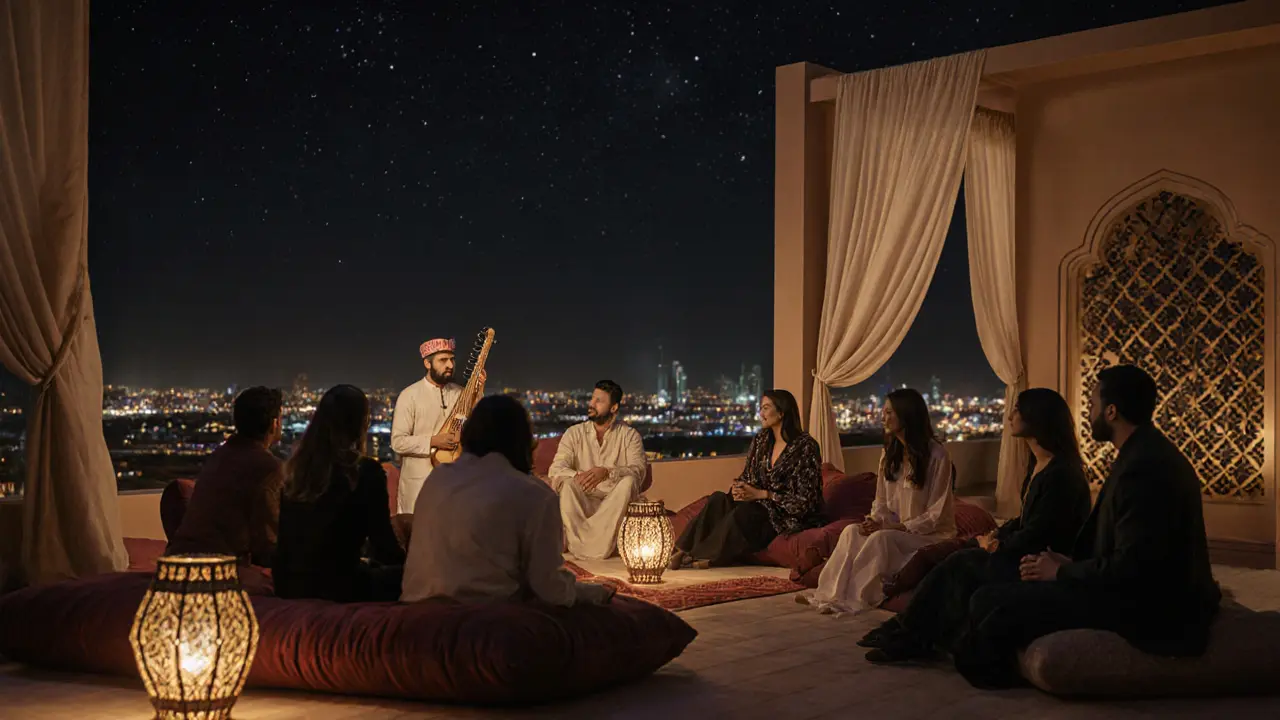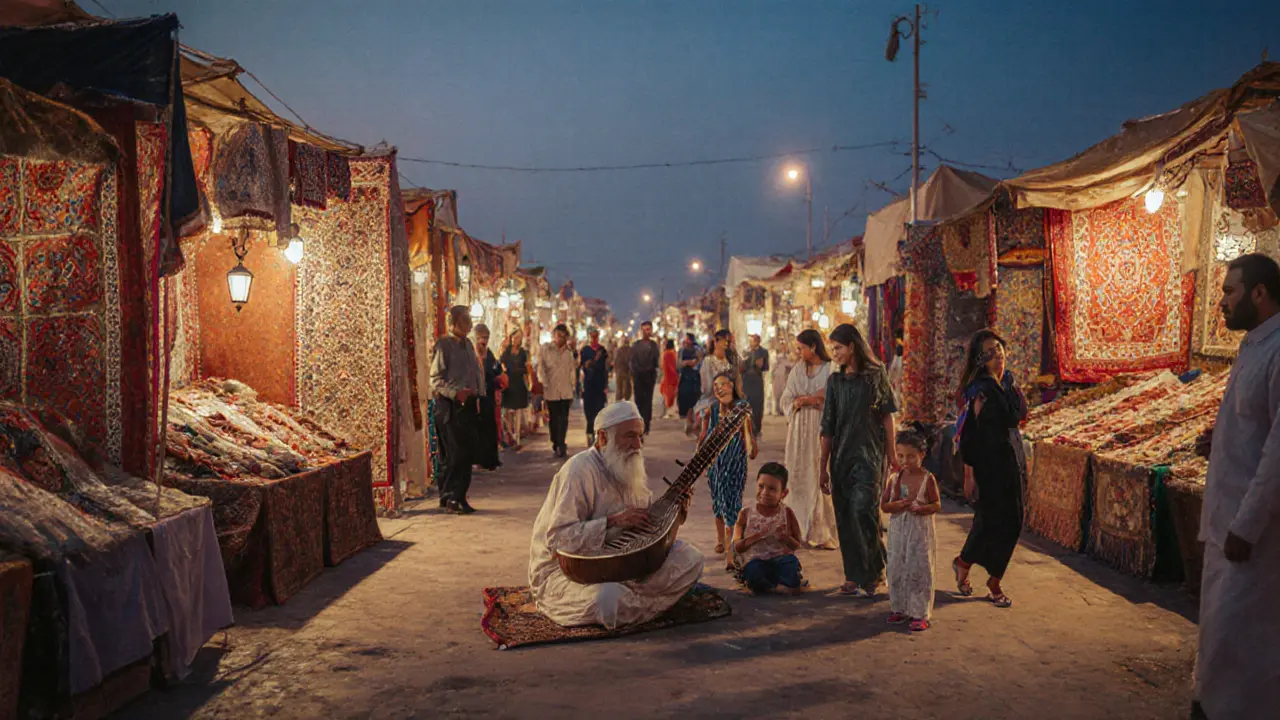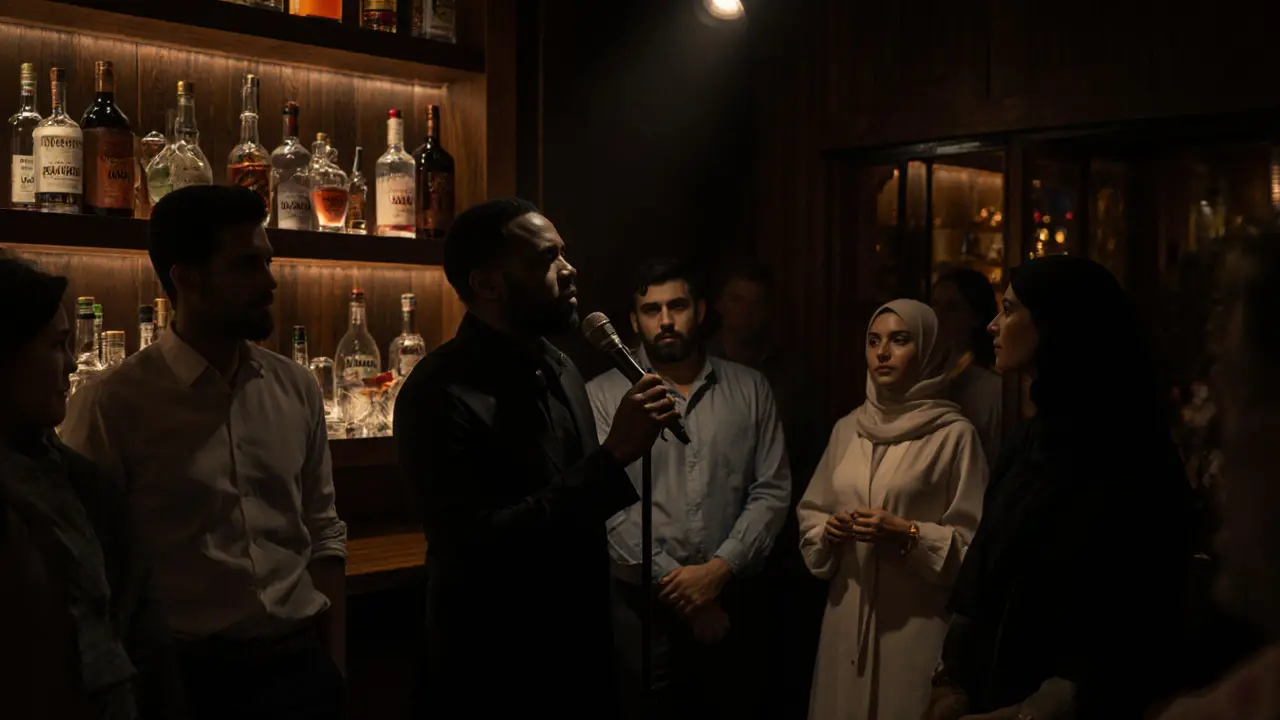Abu Dhabi Nightlife: Where Music, Dance, and Culture Come Alive After Dark

Nov, 2 2025
Abu Dhabi doesn’t just shut down when the sun goes down. While it’s often seen as the quieter cousin of Dubai, the city’s nightlife is quietly thriving-rooted in tradition, fueled by global beats, and shaped by a culture that knows how to celebrate without losing its soul. Forget the wild party scenes you might expect elsewhere. Here, the night unfolds like a slow dance: elegant, intentional, and deeply connected to place.
Music That Moves the City
Abu Dhabi’s music scene isn’t about loud bass drops at 2 a.m. It’s about the haunting strings of an oud echoing through a rooftop lounge in Al Maryah Island, or the rhythmic pulse of Arabic percussion blending with jazz at a hidden bar in Al Bateen. Live music isn’t an afterthought-it’s the heartbeat of the evening.
Places like Al Diwan and Al Maqam host weekly performances by regional artists who mix Emirati folk with modern sounds. You’ll hear the tanbura, the ney, and the darbuka alongside electric guitars and synthesizers. It’s not fusion for the sake of trend-it’s heritage being reimagined. On Fridays, the Louvre Abu Dhabi’s courtyard turns into an open-air concert space, where local bands play under the stars to crowds sipping cardamom coffee and Arabic sweets.
International acts come too, but rarely for stadium shows. More often, you’ll find indie rock bands from Berlin or soul singers from Lagos performing in intimate venues like The Jazz Bar or Soundwave. These aren’t just concerts-they’re cultural exchanges. You’ll sit next to Emirati families, expats from India, and students from the UK, all swaying to the same rhythm.
Dance That Tells Stories
Dance in Abu Dhabi isn’t just movement-it’s memory. The traditional Ayyala, a rhythmic sword dance performed by men in white thobes, is still seen at national celebrations and cultural festivals. But now, you can catch modern interpretations at places like Al Qasr Cultural Centre or during the annual Abu Dhabi Festival, where contemporary dancers reinterpret Bedouin movements with projections and lighting that turn the stage into a desert at midnight.
For those looking to move themselves, salsa and belly dance classes are booming. Studios like Dance Abu Dhabi and Shamal Studios offer drop-in sessions every Wednesday and Saturday. No experience needed. Just show up. You’ll find lawyers from Canada, engineers from the Philippines, and Emirati women in hijabs all learning the same steps, laughing when they miss the beat, and bonding over shared joy.
And yes, there are clubs where people dance till dawn. But even there, the vibe is different. At Club 88 or Blu Marini, the music might be house or EDM, but the dress code is polished-no tank tops, no flip-flops. It’s not about showing off. It’s about respect-for the space, the culture, and the people around you.
Culture Is the Foundation, Not the Decor
Abu Dhabi’s nightlife doesn’t slap on Arabic motifs like wallpaper. It lives them. At Al Maha Dining, the menu changes monthly to honor a different Emirati region-dates from Liwa, fish from Al Ain, spices from Fujairah. The staff wear traditional dress. The lighting is soft, the music is ambient, and the conversations are quiet. This isn’t a themed restaurant. It’s a living archive.
Even the bars follow this rule. At Al Maha Bar, cocktails are named after Bedouin poetry. The Desert Wind is made with date syrup, rosewater, and gin. The Al Harees blends cardamom, saffron, and bourbon. You don’t order a drink-you taste a story.
And then there are the pop-up events. On the first Friday of every month, the Corniche turns into a cultural bazaar. Local artisans sell handwoven rugs, calligraphers write names in Arabic script, and elders play traditional games like Al Khunja and Al Mabrouk. Families gather. Children run between stalls. Music plays softly in the background. It’s not a tourist attraction. It’s a neighborhood ritual.

What Makes It Different From Dubai?
People compare Abu Dhabi and Dubai like night and day-and they’re right. Dubai’s nightlife screams. Abu Dhabi’s whispers. But the whisper is louder in its own way.
Dubai has mega-clubs with bottle service and celebrity DJs. Abu Dhabi has rooftop lounges where the DJ spins vinyl and the crowd is made up of people who actually want to hear the music. Dubai charges $100 to get in. Abu Dhabi charges $15-or sometimes nothing at all if you’re invited to a private cultural gathering.
Dubai’s clubs open at 10 p.m. and close at 3 a.m. Abu Dhabi’s best spots don’t even start buzzing until midnight. And they don’t rush you out. If you’re still there at 4 a.m., sipping tea and talking about poetry, the staff will bring you fresh dates and ask if you’d like to join the next morning’s falconry tour.
There’s no VIP section in Abu Dhabi nightlife. There’s just space-for everyone. Whether you’re a 22-year-old student or a 65-year-old retiree, you’re welcome. You don’t need to be rich. You just need to be curious.
Where to Go, When to Go
- Friday nights are the peak. That’s when locals let loose after prayer and family time. Start at Al Diwan for live music, then walk to the Corniche for the monthly cultural bazaar.
- Saturday evenings are for quieter vibes. Try The Jazz Bar or Al Maqam for soulful tunes and craft cocktails.
- Wednesday nights at Dance Abu Dhabi are perfect for beginners. No pressure. Just movement.
- First weekend of each month is the Abu Dhabi Festival. Book tickets early. The events sell out fast.
- Don’t miss the Yas Island Night Market on weekends. Food trucks, live oud players, and fire dancers make it a must-visit.

What to Know Before You Go
Abu Dhabi’s nightlife is open, but it’s not wild. Here’s what works:
- dress modestly. No bare shoulders or shorts below the knee in public venues.
- alcohol is served only in licensed venues-hotels, clubs, and private lounges. Don’t expect to buy it at a convenience store.
- cash is still king at smaller venues. Many places don’t take cards.
- the best experiences aren’t on Instagram. Ask a local. Ask a hotel concierge. Ask someone who’s lived here five years.
- Friday and Saturday are the only guaranteed busy nights. Sunday through Thursday? You’ll have the place to yourself.
Why It Matters
Abu Dhabi’s nightlife isn’t just about having fun. It’s about how a city holds onto its identity while welcoming the world. You won’t find neon signs or EDM drops here. But you will find something rarer: belonging.
At 1 a.m., sitting on a cushioned bench under a lantern-lit arch, listening to a poet recite lines about the desert, you realize this isn’t a party. It’s a pause. A moment where history, music, movement, and human connection come together-quietly, beautifully, and without apology.
That’s the real nightlife of Abu Dhabi. And it’s not loud. But it stays with you long after the music ends.
Is Abu Dhabi nightlife safe for tourists?
Yes, Abu Dhabi is one of the safest cities in the world for tourists. Nightlife venues are well-lit, staffed by trained personnel, and closely monitored. Police patrols are common near popular spots like the Corniche and Yas Island. As long as you dress respectfully and avoid public intoxication, you’ll have no issues.
Can I drink alcohol in Abu Dhabi nightlife spots?
Yes, but only in licensed venues-hotels, clubs, and private lounges. You cannot buy alcohol at supermarkets or carry it in public. Most places require you to show your passport for ID verification. Drinking on the street or in unlicensed areas is illegal and can result in fines or detention.
What’s the best night to experience live Emirati music?
Fridays are the best. That’s when venues like Al Diwan and Al Maqam host traditional performances, often followed by open mic sessions. The Abu Dhabi Festival also features live Emirati music on the first weekend of every month. Check their official calendar-it’s updated monthly.
Are there any free nightlife events in Abu Dhabi?
Yes. The monthly Corniche Cultural Bazaar is free to attend. So are many of the open-air concerts at the Louvre Abu Dhabi courtyard and the public screenings at Qasr Al Hosn. The Yas Island Night Market is also free-just pay for food or souvenirs if you want them.
What’s the dress code for Abu Dhabi clubs?
Smart casual. Men should wear collared shirts and long pants. Women should cover shoulders and knees. Flip-flops, tank tops, and overly revealing clothing are not allowed. Some upscale venues may require jackets for men. When in doubt, dress a little more formal than you think you need to.
Can I go to Abu Dhabi nightlife alone?
Absolutely. Many locals and expats enjoy solo nights out. Cafés, lounges, and cultural events are very welcoming to individuals. Just be mindful of your surroundings, especially late at night. Stick to well-known areas like Al Maryah Island, Al Bateen, and the Corniche. Avoid isolated streets.
How late do places stay open?
Most clubs and bars close by 2 a.m. or 3 a.m. But many lounges and cultural venues stay open until 4 a.m. or later, especially on weekends. Some rooftop lounges serve coffee and tea until dawn, making them perfect for quiet conversations after the music ends.
Is Abu Dhabi nightlife family-friendly?
Many evening events are. Cultural bazaars, open-air concerts, and food markets welcome families. But clubs and bars are adults-only. If you’re with kids, aim for early evening events-like the Friday night Corniche gatherings or weekend performances at the Cultural Foundation. These are designed for all ages.
Next time you’re in Abu Dhabi, don’t just visit the museums and palaces. Stay out after dark. Let the music pull you in. Let the rhythm of the city surprise you. You’ll leave not just with memories-but with a deeper understanding of what it means to belong.